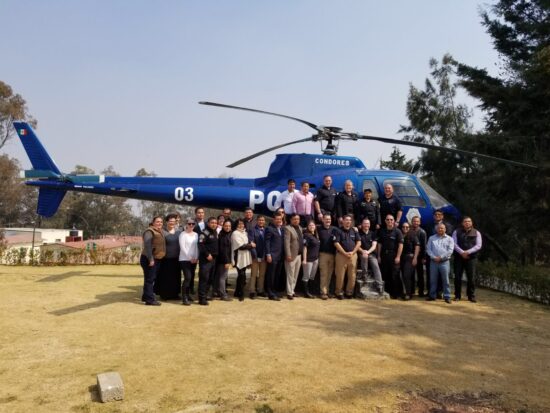By Jason Terry, Associate Director, Exchanges & Professional Development, Global Ties U.S.
When law enforcement professionals from the United States and Mexico have the opportunity to deepen their understanding of each others’ criminal justice system, real change can occur on both sides. That is what the Police Professionalization Exchange Program (PPEP) seeks to accomplish.

Participants and trainers pose with a helicopter during their visit to the Universidad de la Policía de la Ciudad de México in Mexico City. Photo credit: Jason Terry
Now entering its second year, PPEP is launching a new series of online training modules and tours of Mexico for U.S. participants. These provide members of U.S. law enforcement agencies with greater context and background of issues facing the criminal justice system in Mexico, while also providing participants from Mexico the opportunity to develop their skills and crime response capabilities as the country continues to strengthen its legal system.
In January, the program completed its first round of training institutes in Mexico. The training team—comprised of law enforcement professionals from Texas, New Jersey, and North Carolina—conducted two-day seminars in Mexico City, Guanajuato, and Toluca. Topics included ethics-based leadership, resource management, recruiting quality talent, and developing a comprehensive training portfolio.
“I THINK OUR CONTINUED FRIENDSHIP AND SHARING OF INFORMATION WILL CONTINUE TO BUILD BRIDGES.”
— PEGGY SCHAEFER, IADLEST
Our trainers, who collectively possess over 150 years of experience in law enforcement professional development, noted some of the common challenges facing police departments in the U.S. and Mexico: both are trying to re-establish public trust in their work and retain quality officers.
“With continued partnerships and a passion for the profession, change can occur,” said Inspector Charles Patnode of the University of Texas System Police Academy.
The team also found common misperceptions of police in Mexico. Peggy Schaefer of the International Association of Directors of Law Enforcement Standards and Training (IADLEST), remarked on the strength of Mexico’s national law enforcement officer database and the practice of conducting periodic background checks on officers. In Mexico City, she found that their simulators for firearms and crime scenes surpasses “more than 80 percent of U.S. training academies.”
Chief Paul Chapa of the Trinity University Police Department added, “Though they may not have the latest technology in some cases as we do in the States… their approach towards twenty-first century policing has been very successful.”
The most notable impact of the training has been the renewed understanding and relationships on both sides of the border. Dan Howard of IADLEST said, “I have been fortunate enough to have had the opportunity to teach close to 1,500 law enforcement recruits and experienced officers… I can say without hesitation, the officers in the classes [in Mexico] were the most appreciative and attentive group of law enforcement personnel.” Schaefer added, “I think our continued friendship and sharing of information will continue to build bridges.”
In 2017, PPEP served 702 participants who visited 92 law enforcement and related agencies during their exchange to the U.S. This year, PPEP expects over 200 participants from Mexico to visit the U.S., more than 100 U.S. participants to travel to Mexico, and plans to serve more than 1,000 participants online through our learning modules.
If you are a Community-Based Member and want to get involved, submit a proposal online (open to CBMs only).
SPECIAL THANKS TO:
Capt. Mike Davis of the Shavano Park Police Department in Texas for coordinating the curriculum and putting the teams together.
Richard Bryan of the Alamo Area Regional Law Enforcement Training Academy in Texas for serving as a team lead.
Community-Based Member organizations who hosted our groups in 2017.
